Igor Raykhelson: Piano Concerto; Cello Concerto
Catalogue No: TOCC0219
EAN/UPC: 5060113442192
Release Date: 2014-03-04
Composer: Igor Raykhelson
Artists: Alexander Kniazev,
Boris Berezovsky,
Hobart Earle,
Russian State Symphony Orchestra
A Fanfare review described Igor Raykhelson's music — in the Toccata Classics release of his Violin and Viola Concertos — as 'a world of unreconstructed and unapologetic Romanticism'; two customer reviews on Amazon wrote of 'beautiful music that draws me into another zone' and 'a delicate, airy beauty that is unique in modern classical music'. Raykhelson's concertos for piano (2007) and cello (2010), written for the two soloists on this recording, maintain the emphasis on a melodic language with its roots in the music of Rachmaninov and Prokofiev.
Boris Berezovsky, piano
Alexander Kniazev, cello
Russian State Symphony Orchestra, orchestra
Hobart Earle, conductor
Listen To This Recording:
-
Piano Concerto in G minor (2007)
- I Moderato affettuoso –
- II Grave –
- III Presto –
- IV Allegro moderato
- I Moderato mosso
- II Allegro
- III Adagio
- IV Allegro maestoso con brio
Cello Concerto in B minor (2010)
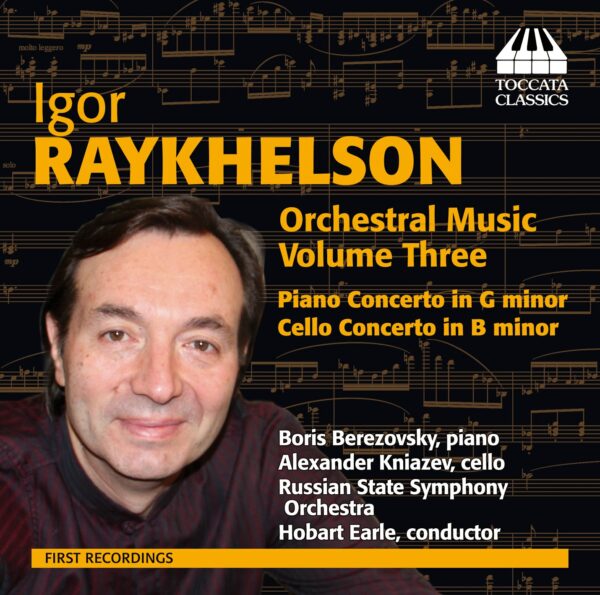
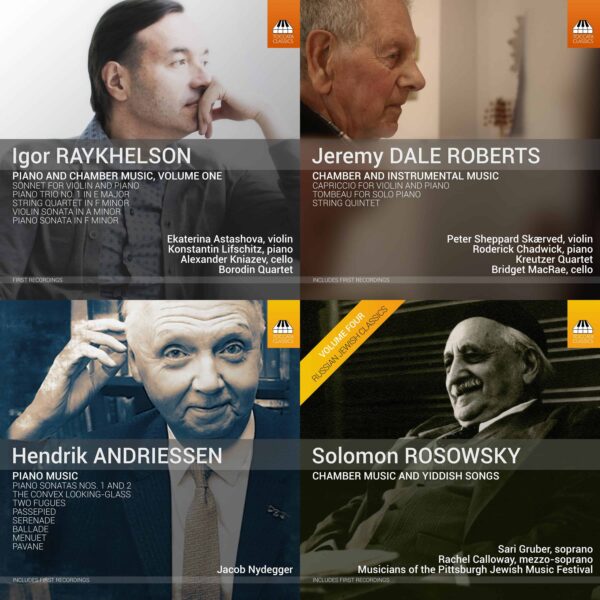
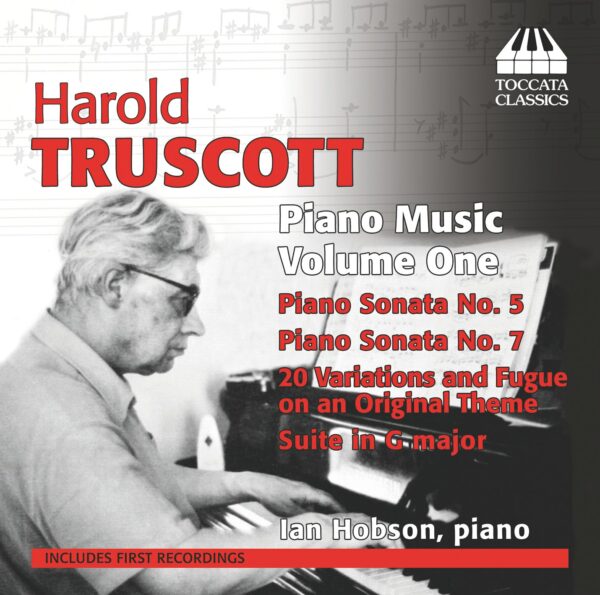
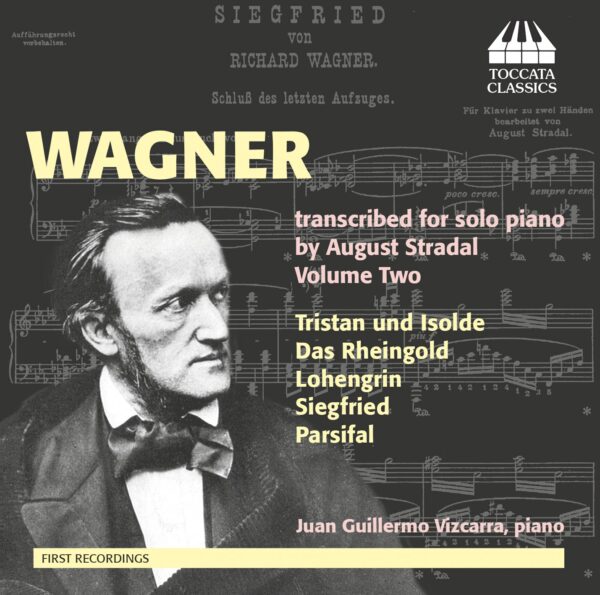
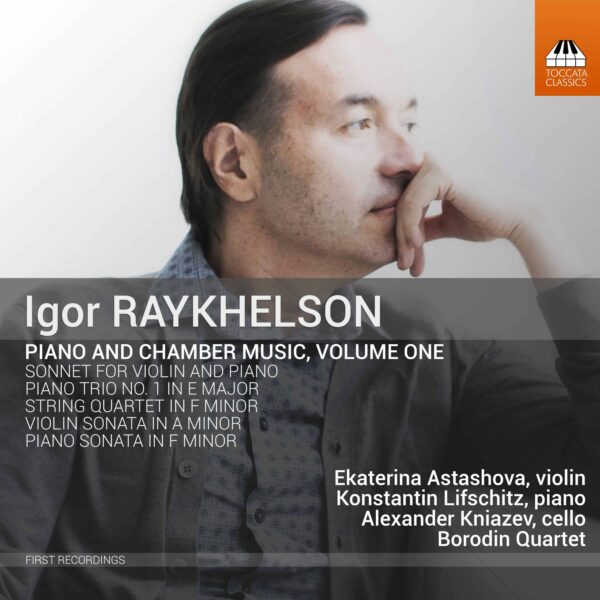
S. Mitchell :
“… Recorded sound is exemplary, performances seem ideal (and with Boris Beresovsky at his magisterial best – what a coup!) and Russian orchestra and conductor Hobart Earle appear to have this new music already under their skins, so as to produce a superlative, authoritative performance. …Now I want to follow every twist and turn of this new stellar talent’s [Raykhelson’s] career… This is a discovery that one feels privileged to have lived long enough to make and enjoy, even in the 21st century. …The BBC Proms should programme the piece as soon as possible.” Amazon
Expedition Audio :
‘…There is certainly an audible jazz influence in his music, but overall, the composer has clearly embraced traditional classical forms and harmonies, producing music of unabashed Romanticism. I was most often reminded of Rachmaninov, but the influences of Prokofiev and Shostakovich are also present. The jazz facet of Raykhelson’s background can be heard in sections reminiscent of Gershwin and Bernstein, especially in his harmonies. However, these jazz influences act to expand and to enhance the musical vocabulary of this fine classical composer.’
—Paul Ballyk, Expedition Audio<
MusicWeb International :
‘… The Piano Concerto in G minor, composed in 2007, is performed by Boris Berezovsky with tremendous richness of tone and technical accomplishment. … [Piano Concerto in G minor] The piano writing is strongly redolent of Rachmaninov – both the third and fourth concertos in particular – but there are even brief motifs that put me in mind of Rimsky-Korsakov; there’s one especially the first movement. Scoring is lush and very lyrical, as one might expect with brass and answering piano writing adding keen lustre to the work’s romanticist spirit. … [Cello Concerto in B minor] The orchestral cloak still cleaves to Rachmaninov but ghostly echoes seem to evoke Prokofiev, even Elgar, though never explicitly. The elegant finale, not without its virtuoso challenges, is rather filmic and makes a satisfying conclusion to a clever, thoughtful and often subtle work. Production values from this label are exceptionally high, with documentation, recording and presentation being outstanding.’
—Jonathan Woolf, MusicWeb International
Fanfare Magazine :
‘…The plurality of expressive means currently available to composers precludes an accusation that Raykhelson is swimming against any tide, perhaps, but the point that this music is generally easily approachable should be made. The result is actually two highly expressive, expertly conceived and executed concertos, heard here in committed performances by their respective dedicatees. …[Piano Concerto:] Gestures that could have come straight from Rachmaninoff’s pen seem somehow at odds with the fact that the music is not overtly virtuosic. There are appealing Tchaikovskian woodwind echoes to the tail end of phrases. Some gestures can veer towards film music, and the first movement ends rather abruptly. Yet the second movement Grave is impressive, in essence a funeral march that holds some truly impressive quiet playing from Berezovsky. …The performance throughout is excellent, with Berezovsky’s rightly famous technique standing him in good stead in the third movement. …[Cello Concerto:] Kniazev’s playing is beautifully expressive, which stands him in good stead for the long-breathed Moderato mosso first movement (a movement aptly subtitled “Poem”). This is a hyper-expressive, long-limbed movement that is beautifully orchestrated.’
—Colin Clarke, Fanfare Magazine